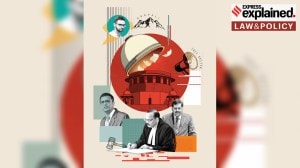Rao8217;s labyrinth
And so it came to pass. For the first time in the history of independent India, a Special Court found it fit to sentence a former prime mi...

And so it came to pass. For the first time in the history of independent India, a Special Court found it fit to sentence a former prime minister to three years of rigorous imprisonment like a common criminal. It is another matter that Pamulaparti Venkata Narasimha Rao, the ninth prime minister of the country, was spared the ignominy of being peremptorily locked up 8212; at least for the moment 8212; since the Additional Sessions Judge Ajit Bharihoke had granted him, and co-conspirator and one-time Cabinet colleague Buta Singh, bail until November 8, so that they could approach the High Court. But for a man, who had through his own political resources made his way to the very top of the country8217;s power hierarchy, to be rendered so low, is surely the stuff of tragedy.
The ancient Greeks, in their exposition of tragic theatre, always looked for a fatal flaw in their hero, a singular feature that would ultimately spell his downfall. Rao8217;s fatal flaw was clearly a Kautilyan cleverness, a cleverness that finally consumed him. The end, in his book of rules, always justified the means. The end, in this case, was unambiguous: to stay in power with all the limited resources at his command. Political analysts have often commended Rao for having remained a prime minister for a full term against all odds. This was indeed some feat for two reasons. First, his was a minority government and one that had the audacity to change the course of the country8217;s economic and political trajectory in several ways. Secondly, he did not have the aura of the Nehru-Gandhi family to commend him unlike earlier Congress prime ministers. Indeed, several of his successors proved unequal to the task of staying on for the full five years that the Constitution granted them. So how did he do it? Through acombination of political acumen, an uncanny instinct for survival and some cynical political manoeuvres, including the one that has brought him the present sentence. In the process, he redefined political morality and the suitcase Harshad Mehta allegedly lugged to 7, Race Course Road, became something of a leit motif of his regime. Today, the patriarch finds himself in a labyrinth, a labyrinth that he helped to build.
Perhaps, the philosopher in Rao will help him perceive the ironies in his present situation. The system of justice is sometimes like that old children8217;s rhyme: sometimes it catches you, sometimes it lets you escape miraculously, just as nine others in the JMM case were let off on the basis of 8220;benefit of doubt8221;. Certainly, the author in Rao will see a promising plot in his own recent history which could, perhaps, lend itself to a novel. It would be the story of a man who was the ultimate insider, who knew the system and mastered it. For years, he worked it to his advantage, as the country watched. Then, things got out of control, his grip on the levers of power slackened. Finally, everything slipped away, the courtiers departed, the music faded. Only the court cases remained with admonishing judges and their lofty verdicts. The Insider had ultimately metamorphosed into the Outsider.
- 01
- 02
- 03
- 04
- 05































